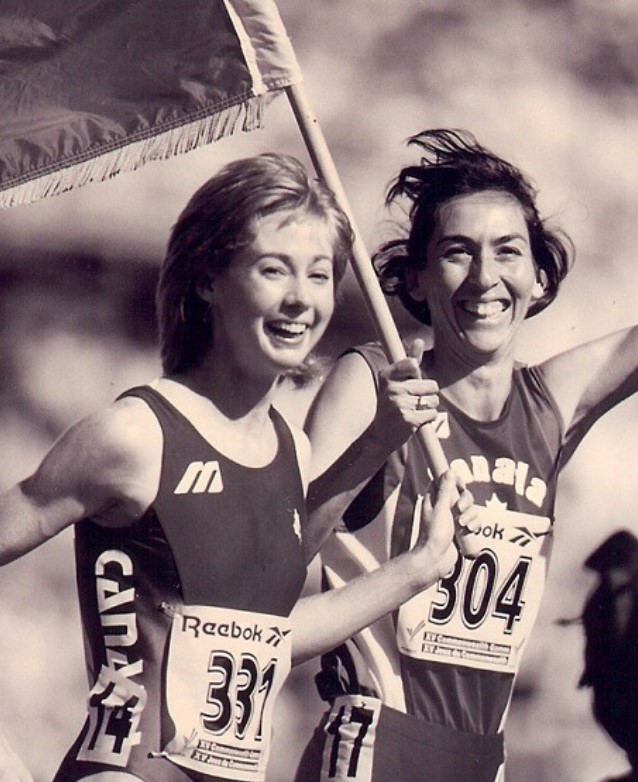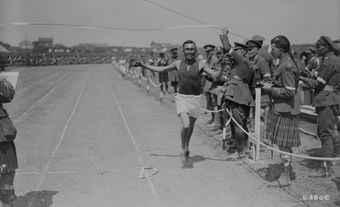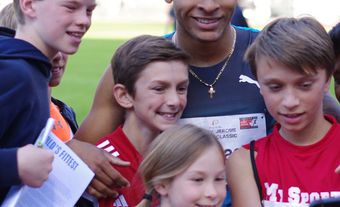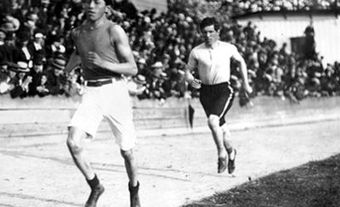Angela Frances Chalmers, world-class distance runner from Birdtail Sioux First Nation (born 6 September 1963 in Brandon, MB). Chalmers is one of the most accomplished Indigenous athletes in Canada. She won three gold medals in total at the Commonwealth Games in 1990 and 1994. An advocate for Indigenous issues, Chalmers has made efforts to connect with and inspire Indigenous youth from across Canada. Among many honours and awards, Chalmers was inducted into Athletics Canada Hall of Fame in 2019.

Angela Chalmers (pictured on the right) won gold for Canada in the 3,000 m event at the 1994 Commonwealth Games in Victoria, BC.
Early life
Angela Chalmers was born to a Sioux woman (see also Dakota) and a soldier of Scottish-Canadian ancestry. In her youth, Chalmers lived in various cities including Shilo, Manitoba and Nanaimo and Victoria, British Columbia. She grew up racing against her brothers. These early races taught her to push herself to win. As she once said, “I learned toughness, competitiveness and the desire to succeed. Those qualities are the number one reason I was successful. Those mental skills helped me to use my physical skills.”
Chalmers started her career at Neelin High School in Brandon in 1979, winning the 400 m, 800 m and 1,500 m races in the Provincial High School Championships. After high school, she received an athletic scholarship to attend Northern Arizona University in Flagstaff, Arizona. There, she earned All-American honours eight times and captured gold at the 1986 National Collegiate Athletic Association Cross Country Championship. (See also Track and Field.)
First Major Competitions
Angela Chalmers’s rise to national fame started with the 1981 Canada Summer Games in Thunder Bay, Ontario. Competing for Manitoba, Chalmers won silver medals in the 800 m and 1500 m races and a gold medal in the 4x400 m relay.
Although she failed to qualify for the 1984 Summer Olympics in Los Angeles, California, she did win the bronze medal in the 3,000 m event at the 1985 Summer Universiade in Kobe, Japan.
Chalmers participated in the 1987 Pan American Games in Indianapolis, Indiana, wining silver in the 3,000 m race. One year later at the 1988 Seoul Summer Olympic Games in Korea, she ran in the 1,500 m and 3,000 m events but did not earn a medal.
DID YOU KNOW?
In the Sioux language, Angela Chalmers’s name is Dusmanwe, which means “Walk Fast Woman.” (See also Indigenous Languages in Canada.)
Height of Career
Angela Chalmers rose to international prominence at the 1990 Commonwealth Games in Auckland, New Zealand. There, she won two gold medals: in the 3,000 m race on 28 January and in the 1,500 m on 3 February. In the process, Chalmers became the first female athlete to win both events.
At the 1992 Barcelona Summer Olympics Games in Spain, Chalmers was eliminated in the semi-finals of the 1,500 m race, but captured the bronze medal in the 3,000 m event. This was a meaningful win for Chalmers because she told her father before he died in 1984 that she would succeed. She said, “My dad was a big influence in my life…I said to him when he was in the hospital that I wanted to prove to him that I could do it.”
In 1994, Chalmers won the gold medal in the 3,000 m event at the Commonwealth Games in Victoria, British Columbia, setting Canadian national and Commonwealth Games records with a time of 8:32.17. Chalmers led the Canadian team into Centennial Stadium for the opening ceremony of the Commonwealth Games on 18 August.

Angela Chalmers carrying the flag for Canada at the 1994 Commonwealth Games in Victoria, BC.
That same year, Chalmers won the gold medal in the 1,500 m race at the 1994 Grand Prix Final in Paris, France. She also won the silver medal in the 1,500 m event at the 1994 International Associations of Athletics Federations (IAFF) World Cup in London, England.
In August 1995, she finished fourth at the IAFF World Championships in Gothenburg, Sweden, losing a bronze medal by only five one-hundreds of a second. Chalmers was picked to compete at the 1996 Summer Olympics in Atlanta, Georgia, in the 1,500 m and 3,000 m events, but a leg injury prevented her from participating.
DID YOU KNOW?
For years, the Manitoba Runners’ Association has held the Joe Keeper-Angela Chalmers Celebration Run, a running competition named for Angela Chalmers and fellow Indigenous runner, Joseph Benjamin Keeper.
Other Roles
Angela Chalmers retired from competition in 1997. Throughout her successful international athletic career, Chalmers never forgot about her Indigenous roots. She made time to visit reserves in Canada to talk to young people about Indigenous empowerment. She also worked closely with the British Columbia Department of Education to limit the dropout rate among Indigenous high school students. (See also Education of Indigenous Peoples in Canada.)
Today, Chalmers lives outside of Brisbane, Australia with her husband, Simon Doyle. Doyle was the Australian 1,500 m record holder from 1991 to 2010. Chalmers and Doyle have two children together.
Honours and Awards
Besides winning several medals and awards in athletic competitions, Chalmers has received many other honours:
- Collegiate Women Sports Awards, Cross Country (1986–87)
- Female Athlete of the Year, Manitoba Sportswriters & Sportscasters Association (1990)
- Phil A. Edwards Memorial Trophy ̶ Track Athlete of the Year, Athletics Canada (1990)
- Athlete of the Year, Athletics Canada (1994)
- National Aboriginal Achievement Award (Indspire Awards),Sports (1995)
- Manitoba Sports Hall of Fame (2001)
- British Columbia Sports Hall of Fame, Athlete (2004)
- Manitoba Runners’ Association Hall of Fame (2007)
- Manitoba High Schools Athletic Association Hall of Fame, Athlete (2009)
- Nanaimo Museum Sports Hall of Fame, Athlete (2010)
- Athletics Canada Hall of Fame, Athlete (2019)

 Share on Facebook
Share on Facebook Share on X
Share on X Share by Email
Share by Email Share on Google Classroom
Share on Google Classroom




